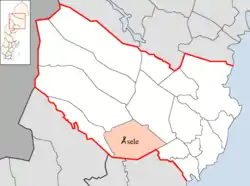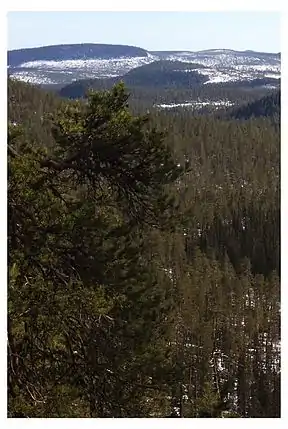Åsele Municipality
Åsele Municipality (Swedish: Åsele kommun) is a municipality in Västerbotten County in northern Sweden. Its seat is located in the town of Åsele. It is located in the southernmost fringe of Lapland.
Åsele Municipality
Åsele kommun | |
|---|---|
 Coat of arms | |
 | |
| Country | Sweden |
| County | Västerbotten County |
| Seat | Åsele |
| Area | |
| • Total | 4,543.95 km2 (1,754.43 sq mi) |
| • Land | 4,223.79 km2 (1,630.81 sq mi) |
| • Water | 320.16 km2 (123.61 sq mi) |
| Area as of 1 January 2014. | |
| Population (31 December 2019)[2] | |
| • Total | 2,794 |
| • Density | 0.61/km2 (1.6/sq mi) |
| Time zone | UTC+1 (CET) |
| • Summer (DST) | UTC+2 (CEST) |
| ISO 3166 code | SE |
| Province | Lapland |
| Municipal code | 2463 |
| Website | www.asele.se |
History
The first Swedish settlement in Åsele Municipality (it was already inhabited by the native Sami people) was in Gafsele south of Åsele. The settlers were Nils Andersson and his wife Brita. They came from Finland in 1674, trying to avoid the war with Russia.
Fredrika is a parish in the municipality. It was created in 1799 and named in honour of Queen Frederica Dorothea Wilhelmina of Sweden. Other nearby parishes were named Dorotea and Vilhelmina, but Åsele refused to take any of these names, as they were proud of themselves and the town.
In 1974 the former market town (köping) Åsele (1959-1970) was amalgamated with Dorotea and Fredrika. In 1980 the Dorotea part was detached, forming a new Dorotea Municipality.
Geography
Geographically, the Ångerman River flows from Vilhelmina through Åsele Municipality, and many electric power stations are built around it.
The town Åsele is located in the middle of the municipality. It has a wooden church, a small historical (open-air) museum, and a nine-hole golf course.
Localities
There are two localities (or urban areas) in Åsele Municipality:[3]
| # | Locality | Population |
|---|---|---|
| 1 | Åsele | 1,920 |
| 2 | Fredrika | 254 |
The municipal seat in bold
Elections
Riksdag
These are the results of the elections to the Riksdag for Åsele Municipality since the 1972 municipal reform. SCB did not publish the party's results for the Sweden Democrats between 1988 and 1998 because of the party's small size nationally.
| Year | Turnout | Votes | V | S | MP | C | L | KD | M | SD | ND |
|---|---|---|---|---|---|---|---|---|---|---|---|
| 1973[4] | 89.9 | 6,086 | 3.7 | 51.8 | 0.0 | 24.7 | 12.2 | 2.7 | 4.4 | 0.0 | 0.0 |
| 1976[5] | 90.9 | 6,299 | 3.3 | 54.1 | 0.0 | 24.7 | 11.4 | 1.9 | 4.6 | 0.0 | 0.0 |
| 1979[6] | 88.7 | 3,380 | 2.9 | 55.9 | 0.0 | 20.5 | 10.5 | 2.7 | 7.4 | 0.0 | 0.0 |
| 1982[7] | 89.3 | 3,309 | 3.6 | 58.3 | 1.0 | 19.9 | 6.5 | 2.9 | 7.9 | 0.0 | 0.0 |
| 1985[8] | 88.0 | 3,149 | 4.2 | 56.7 | 1.0 | 21.1 | 8.8 | 0.0 | 8.2 | 0.0 | 0.0 |
| 1988[9] | 86.2 | 2,893 | 3.7 | 57.9 | 3.5 | 16.8 | 7.7 | 4.7 | 5.5 | 0.0 | 0.0 |
| 1991[10] | 83.2 | 2,708 | 4.8 | 53.7 | 1.3 | 15.5 | 5.9 | 6.9 | 8.3 | 0.0 | 1.3 |
| 1994[11] | 85.1 | 2,705 | 5.1 | 59.9 | 4.1 | 12.6 | 4.7 | 4.4 | 8.1 | 0.0 | 0.7 |
| 1998[12] | 81.2 | 2,442 | 11.8 | 50.5 | 2.6 | 10.6 | 3.8 | 8.4 | 9.1 | 0.0 | 0.0 |
| 2002[13] | 79.9 | 2,208 | 9.1 | 52.3 | 1.9 | 17.2 | 5.7 | 6.0 | 5.1 | 0.4 | 0.0 |
| 2006[14] | 80.7 | 2,070 | 7.0 | 50.6 | 1.1 | 16.3 | 4.8 | 6.5 | 10.0 | 1.6 | 0.0 |
| 2010[15] | 83.3 | 2,004 | 7.4 | 51.2 | 1.9 | 9.6 | 5.8 | 5.4 | 13.6 | 3.9 | 0.0 |
| 2014[16] | 84.9 | 1,893 | 9.1 | 44.8 | 1.9 | 10.6 | 5.2 | 3.4 | 11.7 | 10.9 | 0.0 |
Blocs
This lists the relative strength of the socialist and centre-right blocs since 1973, but parties not elected to the Riksdag are inserted as "other", including the Sweden Democrats results from 1988 to 2006, but also the Christian Democrats pre-1991 and the Greens in 1982, 1985 and 1991. The sources are identical to the table above. The coalition or government mandate marked in bold formed the government after the election. New Democracy got elected in 1991 but are still listed as "other" due to the short lifespan of the party.
| Year | Turnout | Votes | Left | Right | SD | Other | Elected |
|---|---|---|---|---|---|---|---|
| 1973 | 89.9 | 6,086 | 55.5 | 41.3 | 0.0 | 3.2 | 96.8 |
| 1976 | 90.9 | 6,299 | 57.4 | 40.7 | 0.0 | 1.9 | 98.1 |
| 1979 | 88.7 | 3,380 | 58.8 | 38.4 | 0.0 | 2.8 | 97.2 |
| 1982 | 89.3 | 3,309 | 61.9 | 34.3 | 0.0 | 4.8 | 95.2 |
| 1985 | 88.0 | 3,149 | 60.9 | 38.1 | 0.0 | 1.0 | 99.0 |
| 1988 | 86.2 | 2,893 | 65.1 | 30.0 | 0.0 | 4.9 | 95.1 |
| 1991 | 83.2 | 2,708 | 58.5 | 36.6 | 0.0 | 4.9 | 96.4 |
| 1994 | 85.1 | 2,705 | 69.1 | 29.8 | 0.0 | 1.1 | 98.9 |
| 1998 | 81.2 | 2,442 | 64.9 | 31.9 | 0.0 | 3.2 | 96.8 |
| 2002 | 79.9 | 2,208 | 63.3 | 34.0 | 0.0 | 2.7 | 97.3 |
| 2006 | 80.7 | 2,070 | 58.7 | 37.6 | 0.0 | 3.7 | 96.3 |
| 2010 | 83.3 | 2,004 | 60.5 | 34.4 | 3.9 | 1.2 | 98.8 |
| 2014 | 84.9 | 1,893 | 55.8 | 30.9 | 10.9 | 2.4 | 97.6 |
Other
The municipality has recently received some recognition as the future site of Europe's largest Thai Buddhist temple.[17]
References
- "Statistiska centralbyrån, Kommunarealer den 1 januari 2014" (in Swedish). Statistics Sweden. 2014-01-01. Archived from the original (Microsoft Excel) on 2016-09-27. Retrieved 2014-04-18.
- "Folkmängd i riket, län och kommuner 31 december 2019" (in Swedish). Statistics Sweden. February 20, 2020. Retrieved February 20, 2020.
- Statistics Sweden as of December 31, 2005
- "Riksdagsvalet 1973 (page 168)" (PDF) (in Swedish). SCB. Retrieved 19 August 2017.
- "Riksdagsvalet 1976 (page 163)" (PDF) (in Swedish). SCB. Retrieved 19 August 2017.
- "Riksdagsvalet 1979 (page 187)" (PDF) (in Swedish). SCB. Retrieved 19 August 2017.
- "Riksdagsvalet 1982 (page 188)" (PDF) (in Swedish). SCB. Retrieved 19 August 2017.
- "Riksdagsvalet 1985 (page 189)" (PDF) (in Swedish). SCB. Retrieved 19 August 2017.
- "Riksdagsvalet 1988 (page 169)" (PDF) (in Swedish). SCB. Retrieved 19 August 2017.
- "Riksdagsvalet 1991 (page 31)" (PDF) (in Swedish). SCB. Retrieved 19 August 2017.
- "Riksdagsvalet 1994 (page 46)" (PDF) (in Swedish). SCB. Retrieved 19 August 2017.
- "Riksdagsvalet 1998 (page 43)" (PDF) (in Swedish). SCB. Retrieved 19 August 2017.
- "Valresultat Riksdag Åsele kommun 2002" (in Swedish). Valmyndigheten. Retrieved 19 August 2017.
- "Valresultat Riksdag Åsele kommun 2006" (in Swedish). Valmyndigheten. Retrieved 19 August 2017.
- "Valresultat Riksdag Åsele kommun 2010" (in Swedish). Valmyndigheten. Retrieved 19 August 2017.
- "Valresultat Riksdag Åsele kommun 2014" (in Swedish). Valmyndigheten. Retrieved 19 August 2017.
- Fact sheet on the official site
External links
| Wikimedia Commons has media related to Åsele Municipality. |
- Åsele Municipality - Official site (in Swedish)
